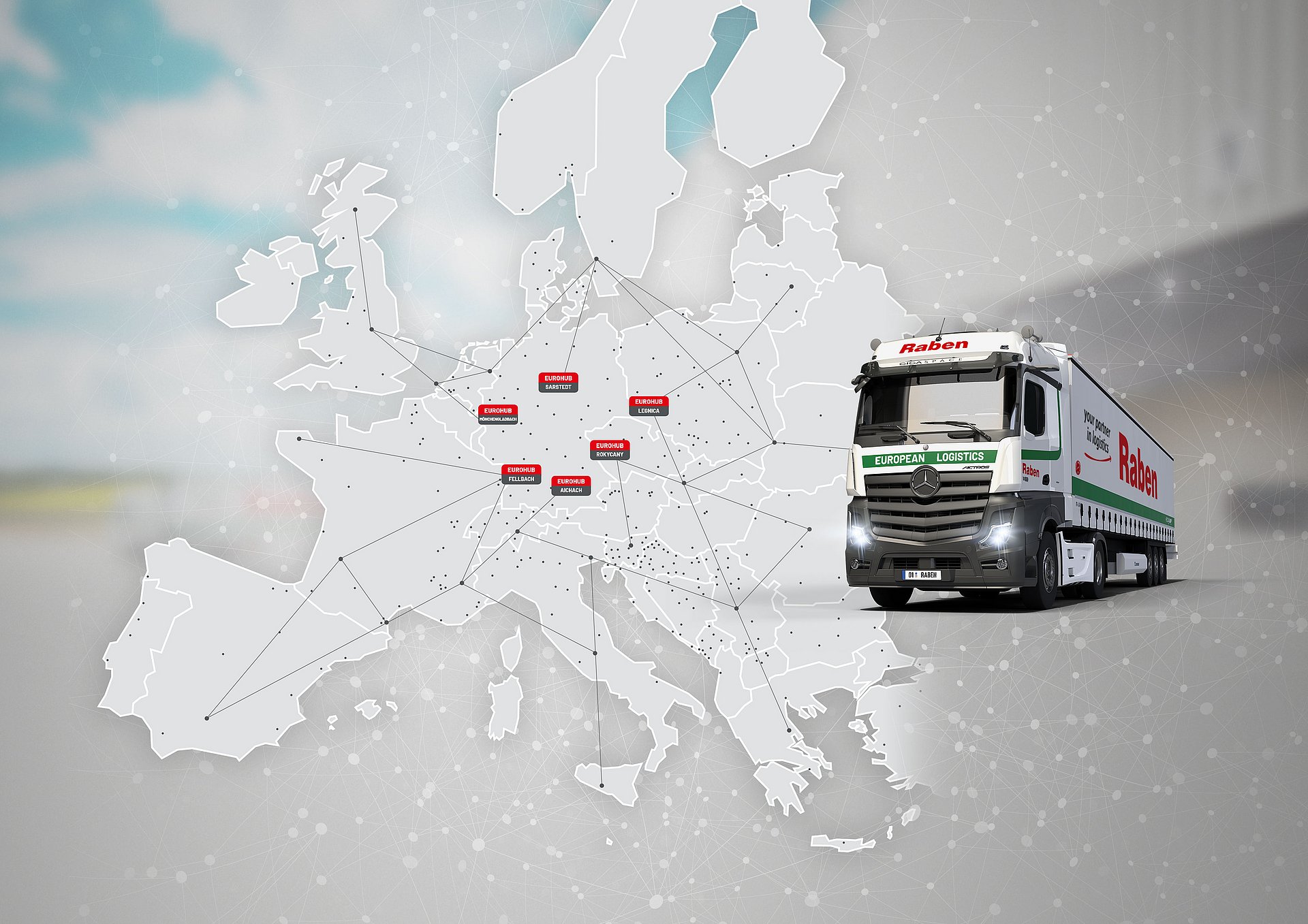
Raben Group has only just managed to close and sum up the year 2022, in which it entered its fifteenth European market, and it is already undergoing another revolution. This time, however, it is not about expansion, but about reorganising the existing structure. Six depots have been assigned the function of Eurohubs - central anchor points in the Raben network, which will be responsible for consolidating groupage cargo for European linehaul traffic. They are intended to complement the fixed, direct transports routes and guarantee strictly timed connections between all the company's European depots.
The Eurohub structure allows us to respond more flexibly to changes in freight volumes and, above all, to achieve shorter lead times. We can offer all our customers the added value of reaching all European destinations as quickly as possible - within 24 to 96 hours, depending on the distance. This 'lean' process organisation translates into a more efficient and reliable supply chain. We are closer to the customer and are designing a more resilient network - explains Ewald Raben, CEO of Raben Group. - An additional benefit is the reduction of CO2 emissions, which is also very important for us as a sustainable company
The new status has been assigned to: Sarstedt (handling connections to Scandinavia), Mönchengladbach (northern France, Benelux, the UK, Ireland), Fellbach (Spain, Portugal, rest of France) and Aichach (Austria, Italy, Poland, Czechia) in Germany, Legnica in Poland (connections inside this market and to the Baltic countries) and Rokycany in Czechia (South-Eastern Europe). The implementation of the Eurohub concept will further strengthen the logistics operator's presence in Germany - which is one of the strongest economies in the European Union - and at the same time seal the strategic role this market has to play on Raben's map.
Eurohubs are characterised by much larger capacity, excellent location and infrastructure. The basis for the operations and future success is, among other things, more than 130 direct links between the mentioned points, 600 daily connections in total, the 40 000 m2 of cross-dock capacity alone and full traceability supported by one TMS system. This applies both to markets where Raben has its own network and those where the company operates through reliable partners.
The changes have been made possible by the achievement of milestones, which the company has been working towards over the past years. Systematic acquisitions have resulted, on the one hand, in entry into new markets (Austrian freight forwarder Bexity acquired in 2022; Greek logistics provider - Intertrans in 2021) and, on the other, in the strengthening and densification of national networks. This refers also to the region where Raben originated - the fourth branch was opened in the Netherlands, in the Maastricht area, at the beginning of April 2023.
Four out of six Eurohubs are located in Germany – the biggest market in Europe, where Raben Group has been operating with its owned groupage network since 2018. A huge contribution to building the Eurohub network has come directly from infrastructure investments in this country. Sarstedt is Raben's new and at the same time key depot in Germany - the operator moved there from Langenhagen in 2022. With a total area of 27 000 m2 (5 500 m2 of cross-dock alone with 52 ramps), the facility represents a more than tenfold increase in logistics capacity compared to the previous location. The beginning of this year marks the opening of a new branch in Aichach, north-west of Augsburg. The new 25 000 m2 location (4 000 m2 of cross-dock alone with 42 ramps) operating immediately as Eurohub is located directly on the A8 highway and is an important hub in Raben's European network for daily connections to Southern and Eastern Europe. Similarly, Rokycany in Czechia, which started its activities in April this year. The depot covers an area of 6 000 m2 of cross-dock capacity and has 56 ramps for easy handling of goods, including ADR. Located in close proximity to the D5 highway, it ensures a fast connection to Germany and other European road networks. It has the potential to significantly speed up and improve the flow of shipments and, thanks to its flexibility, contribute to the future development not only of connections within Czechia and Slovakia, but also of other Raben Group countries: Hungary, Romania, Bulgaria and Greece.
The Eurohubs concept is a priority for Raben Group. For the time being the company has no plans for further geographical expansion but intends to densify the network and invest in digitalisation. The project to develop and reorganise the international lines across all fifteen countries in the Raben family is admittedly still underway:
With the targeted and systematic cargo consolidation, we want to drive the expansion of the network and development of Eurohubs, as well as the comprehensive integration of all European regions. This will provide us with better capacity utilisation, thereby increasing the economic efficiency of our transports and more 'green' logistics - concludes Ewald Raben.
You can get more insight into the Eurohub structure - and many other issues - with Raben Group representatives at the company's stand at Transport Logistic 2023, which will take place on 9-12 May in Munich.